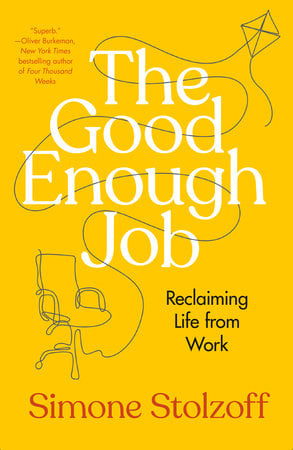Reviewed by Rachael Baker, NetVUE Director of Professional Development

The Good Enough Job explores the relationships that people (in North America) have with their paid work. The author, Simone Stolzoff, invites us to consider stories in which interviewed workers are grappling with the reality that the promises for fulfillment in their paid careers have not come to pass. The book explores various ways in which their relationships with work shift as they recognize that those promises were myths. Stolzoff writes that “our society treats those who haven’t found a calling—who don’t love what they get paid to do—as if they’ve committed some kind of moral failure. [. . .] However, the notion that we should always love our job creates outsized expectations for what a job can deliver. It ignores the tedium that exists in every line of work, blinds us to the flaws a dream job may have, and creates conditions in which workers are willing to accept less than they deserve .” Using the stories of various white-collar workers, Stolzoff makes the case that a fulfilling life requires more than an often idolized “dream” job.

The Good Enough Job is a quick, friendly read with some compelling reflections about the relationships among our work, identity, and value. The book is not a text about vocation as it is understood within the NetVUE community, yet it can support the work we do with vocation on our campuses. The stories in the book could have a place in an upper-level vocation course or reflective work on an internship, where it could spark students’ imagination about the spaces and questions they will navigate related to career and work choices. The text’s biggest drawback is its focus on a subset of workers, particularly white-collar ones. Not all people have the ability or privilege to make the job changes that the workers in this book explore. Many of the interviewed workers can quit their jobs and try something new or risky. However, the underlying narrative of the book focuses on reframing the role of work in our lives. This narrative is available to everyone and keeps the conversation more widely accessible.

As I read the stories of the interviewed workers, I reflected on the value of the time we invest in purpose exploration with students. We use vocation to help students explore their identities and practice asking questions that will equip them to discern well as they enter the broader world of work. Students who do this exploration are preparing to ask the questions that are just beginning to emerge for the mid-career workers in the book. I do appreciate that we meet the workers in the book in the middle of their stories—when the myths of work as fulfillment have crumbled but have not been fully replaced with something else. Through the narrative, we travel alongside the workers as they are asking questions and become open to new possibilities in their purpose journey. I was prompted to think again about how to use personal narratives to help students imagine how they might grapple with questions of purpose and calling as they navigate the world of work. Engaging with this text may offer a new avenue for conversations about the ongoing nature of purpose discernment with our students.
Full citation: Stolzoff, Simone. The Good Enough Job: Reclaiming Life from Work. (Portfolio/Penguin, 2023).

To report a technical problem with the website, or to offer suggestions for navigation and content issues, please contact Alex Stephenson, NetVUE communications coordinator, at astephenson@cic.edu.


